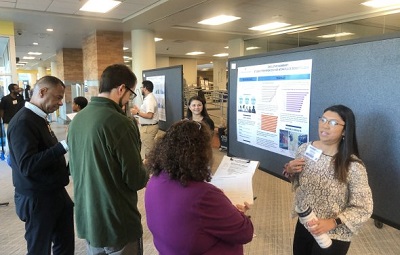Deliverable Fresh Meal Kits: Food Safety
Description/Abstract/Artist Statement
Investigating food safety includes considering the environmental factors and procedures that keep food fresh while avoiding contamination to prevent food poisoning. Given the new market for deliverable fresh meal kits, one wonders what precautions are taken and procedures used by the deliverable food providers; and if their food is safe for consumption. For this project, I investigated the food safety attributes of three different deliverable meal kit companies. First, I compared their shipping/packaging methods. Then I calculated the bacterial colony counts on their food products using the Standard Plate Method. Finally, I identified all bacterial isolates using the Vitek 2 Compact identification system. The shipping and packaging protocols maintained an acceptable level of temperature control and separation between products. It is important to note that temperature from delivery to opening would affect colony counts. Our temperatures were maintained from receipt to incubation. All bacterial colony counts were within the allowable range according to the Food and Drug Administration guidelines; however, my quality control failed for one company due to Trypticase Soy Agar contamination. Those results were excluded from this study. The bacteria identified were typical for poultry and produce products, and no enteric pathogens known to cause food born illness were isolated. Following cleaning and cooking instructions, I concluded that the three deliverable meal kit companies provide quality foods that are safe for consumption.
Faculty Advisor/Mentor
Angela Wilson
Faculty Advisor/Mentor Department
Medical Laboratory Science Department
College Affiliation
Ellmer College of Health Sciences
Presentation Type
Poster
Disciplines
Food Microbiology | Medical Microbiology | Medical Sciences
Session Title
Poster Session
Location
Learning Commons Lobby @ Perry Library
Start Date
3-25-2023 8:30 AM
End Date
3-25-2023 10:00 AM
Deliverable Fresh Meal Kits: Food Safety
Learning Commons Lobby @ Perry Library
Investigating food safety includes considering the environmental factors and procedures that keep food fresh while avoiding contamination to prevent food poisoning. Given the new market for deliverable fresh meal kits, one wonders what precautions are taken and procedures used by the deliverable food providers; and if their food is safe for consumption. For this project, I investigated the food safety attributes of three different deliverable meal kit companies. First, I compared their shipping/packaging methods. Then I calculated the bacterial colony counts on their food products using the Standard Plate Method. Finally, I identified all bacterial isolates using the Vitek 2 Compact identification system. The shipping and packaging protocols maintained an acceptable level of temperature control and separation between products. It is important to note that temperature from delivery to opening would affect colony counts. Our temperatures were maintained from receipt to incubation. All bacterial colony counts were within the allowable range according to the Food and Drug Administration guidelines; however, my quality control failed for one company due to Trypticase Soy Agar contamination. Those results were excluded from this study. The bacteria identified were typical for poultry and produce products, and no enteric pathogens known to cause food born illness were isolated. Following cleaning and cooking instructions, I concluded that the three deliverable meal kit companies provide quality foods that are safe for consumption.


